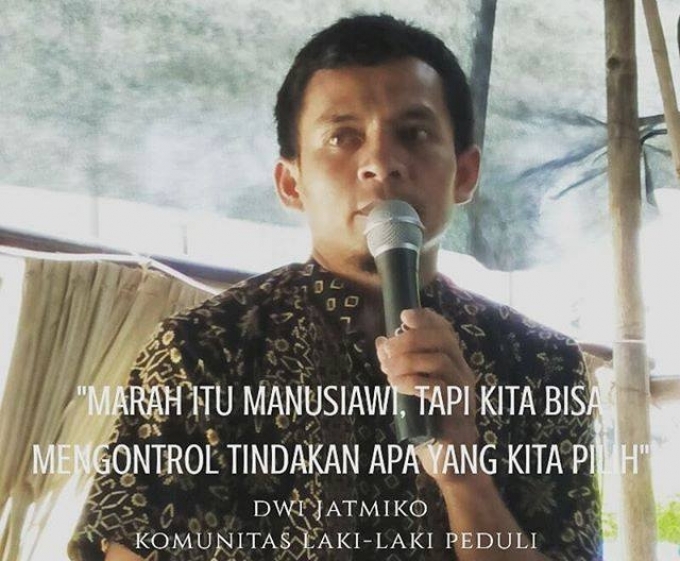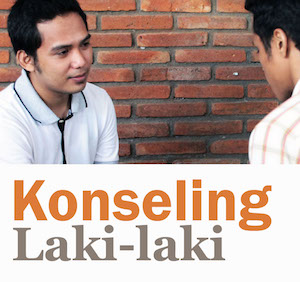"We've heard the Javanese phrase: Jaran kepang jaran kore, wong lanang menangan dhewe (men always want to win their desire, red.) The phrase is perceived to be trigger of domestic violence, what is your opinion?" asked the moderator to Jatmiko, followed by audience laughter.
Jatmiko, alumni of father class of Men Care program in Bendung Village, Semin sub district, Gunungkidul, was given opportunity to share stories and experiences in discussions facilitated by Rifka Annisa. The discussion was part of Jagongan Media Rakyat (JMR) even, held at the Jogja National Museum on Thursday the 8th of March. The JMR was coordinated by the Combine Resource Institution (CRI). Partnering with Rifka Annisa, the JMR presented a discussions under the title "Empowered community, prevent violence against women and children."
For Jatmiko, ‘Men Care’ was a new identity, and required a process for which he had to undergo. "That's why we named it ‘Men Care' because a lot of men out there do not have sense of caring. We want to create ‘New Men’," said Jatmiko.
Men live in the shadow of both privilege and fear brought on by the patriarchal culture. Patriarchal culture has been embedded and historically inherited until now. We live in a culture where many families currently still hold onto patriarchal principles. Jatmiko recounts, in the surrounding community there are still beliefs which conclude a man must be strong and dominant, whilst a women is only dealings with domestic work which considered as 'dapur-sumur-kasur’ or ‘kitchen-well-mattress '.
He said, women passing elementary school is considered enough because they will only dealing with dometic work.“Men have bigger responsibilities. Wong lanang (male, red.) should be able to earn for their family living," he said.
Javanese people, Jatmiko added, always correlate something with the name. For example, the term of wanita means wani ditata or women should be directed and controlled. Inevitably, the woman must be dominated by men. He reflected, until now he is still taking effort to this gender equality. His mother-in-law will never agree if he shares the domestic work with his wife.
"I cook and I wash the dishes. My mother-in-law does not agree. She said wong lanang (male, red) should not have to do domestic work, it is women’s work," he said.
He often explains to his mother-in-law that this is not something embarrassing if men doing domestic work, it will not degrade dignity. It is not like it is intended, but then how can her partner and Jatmiko between mutually responsible preclude. He added when they share the role of doing the household work and childcare, can reverse some of their feel. "My wife become more lovable and she can spend more time for me and the family as well," Jatmiko said.
Triggers of Violence
‘Men care’ is not only a way of sharing the work, but it is also about men caring about the relationship with their spouse and children. When they do not have idea about how to share domestic work and take care of their relationship, it often becomes the cause of conflict between a husband and wife, and may contribute to domestic violence.
Jatmiko said, his domestic violence was backed by a myriad of economic problems. When he joined the ‘Men Care’ class which held by Rifka Annisa, he and his group received education regarding communication with partners, anger management, managing family finances, and so on. However, two things which are very memorable for Jatmiko, which he is trying to apply presently, is how to communicate with our wife and manage anger.
Communication can be used as a form of message delivery to the couple. We really want to communicate this to our spouse, but we do not know how to deliver it. Ignorance and mistakes in communicating can cause conflict. When effective communication is built from the beginning, the act of violence against a spouse should not occur.
Then, regarding anger management, Jatmiko and his group are well aware that experiencing anger is a normal human emotion that we have the ability to manage. Anger is a process; there must be a resolution to what has caused it. Between emotions and actions there are a few seconds, where we are able to select what we are going to do.
"Experiencing anger is human. For example, when we are angry, our eyes may be red and our hands may clench however, behind this we have the time to choose how we are going to express our anger. It may be that we choose to express it in a negative way such as, immediately hitting a child, pinching a child or hitting our partner. But we do have the choice of how we express our anger," Jatmiko said.
He explained there are several options that can be taken when angry. One of them is silence, giving space for time out to calm down and reflect situation. For Jatmiko, this is not always easy. Everything needs a process; he is still working on it.
Challenge
Since joining the ‘Men Care’ community, Jatmiko is always encouraged to share his knowledge and experience with others. Often, he is uneasy when he hears the sounds of his neighbor’s conflict in his village.
Initially, he felt awkward when there was a crisis in the household next door. He intended to help, but later he worried about the negative consequences that may occur if he does it.
There were concerns that if he intervened he would be envied by his own neighbors. After careful consideration, he ventured over to try and prevent his neighbor’s conflict from resulting in domestic violence.
"When there is a dispute at my next door neighbors, I go. I enter the house and am limited to observing only. I stood in front of those who were bickering without a word or without any expressions. Yes I stand up," recalls Jatmiko.
Through that way, Jatmiko thinks he can anticipate that the spouse do not suffer physical violence or even persecution. Jatmiko already know what steps he will do next. "They (who were involved in conflict) would think, “Oh oke, yesterday there was socialization that violence can be reported according to Indonesian law. If it is officially reported, there are now witnesses. So they will re-think about whether they want to hit his wife at that time," added Jatmiko.
Furthermore, reminds Jatmiko, we must not forget to provide clarification to the couple of concern. We need to explain the reason as to why we came when the neighbors were fighting, not to watch, but to help try and prevent it. According to Jatmiko, clarification and explanation is important so that those concerned are not hostile to us.
"We explain slowly despite they will complaint us. They might say if we have to mind our business. If we intervene, they might blame us for acting like the most self-righteous person. It’s okay. But we've got a belief that one day they will be grateful to us," Jatmiko said.
Not Afraid of Change
To be a ‘Men Care’, Jatmiko continues to support the processes of positive change. Living in a village makes it impossible to leave a high social sense. ‘Men Care’ do not only care about their families, but also about their surrounding community. If there was anything happening in the village, many people immediately want to know. This curiosity prompted Jatmiko to invite the community to talk about the problems that exist in their villages.
Currently, Jatmiko and his communities are working with community leaders and religious figures. More and more religious leaders are getting better, he said. When religious leaders are willing to make behavioral changes, such as giving examples of parenting responsibilities and sharing roles in the household, it is influential for change in the wider community.
"I always say to them, Pak Ustadz (religious leader in Moslem community, red.) has already committed to do laundry for his family, take care of their children, work on domestic work, so how come we do not?" It is how Jatmiko encourages his friends. Showing this effort is supported by a respected takmir mushola (people who manage mosque, red) in his village is beneficial for teaching the wider community about it.
Another approach that Jatmiko uses is to invite his friends to hang out and chat, or get some coffee and have discussions at his small shop. When using this approach Jatmiko does not directly address the problem straight away, as it is a very sensitive topic. He first creates a safe and relaxed atmosphere, where they will feel comfortable disclosing their stories and experiences without judgment or obstacles. If we already go into the core problems we can facilitate to discuss it further. He never does so in a judging or patronizing manner.
"I usually share experiences that are roughly similar to their problem. I think it's more effective. Through that way, we touch his heart first. After they agree on things that he thinks are important and beneficial to him and his family, they then become agent to convey to his family, to his brother, and friend. It will be so easy and helpful in conveying this."
In relation to parenting children, Jatmiko made an agreement with his wife that the work in the home and parenting should be a shared responsibility. It is indeed difficult at first, but now he always sets aside a definite time effectively care for his children. Now for the first time, the housework is settled before he goes out to work for a living. He admitted there are several household chores he is unable to do, such as ironing. Consequently, he should always pay for a service for other people to do the ironing.
"It doesn't have to be the equivalent of everything we do, but proportionate with our capabilities. If we cannot do something do not be shy, just say you cannot. So indeed if not, it may be taken over by my partner,” he concluded.
-------------------
Author: Defirentia One, Program development officer at Rifka Annisa
Translated by Kathleen Sherrin, intern student from Charles Darwin University, Australia








